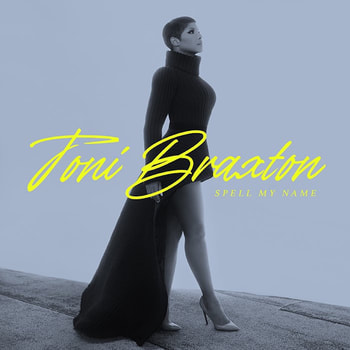
In the latter half of 2020, Toni Braxton released her tenth studio album, Spell My Name. Though its performance on Billboard’s R&B charts was relatively acceptable (including singles), it didn’t gain much steam overall. Moreover, it didn’t earn any RIAA certifications. It’s a shame the record didn’t have more ears on it. Not only was it of great quality, it presented solutions to a problem many artists encounter.
The longer an artist is around, it can become challenging to keep things fresh. There’s a tendency to respond to this by working in extremes. Attempts to be overwhelmingly contemporary and sit at the ‘cool kid’s table’ usually come off as contrived. Shifts in tone are frequently too hard and fast, leading to calls for a return to the old guard. Conversely, sticking to their own status quo garners audience complaints of creative rigidity and datedness. Landing sweetly between the two antipodes is a delicate balancing act. Spell My Name should be considered a blueprint of how to master it.
For starters, Braxton doesn’t shy away from her position as an established artist over the age of 50. She doesn’t treat this as something to be ashamed of or camouflaged with Gen Z-targeted gimmicks. Case in point, the title track is about entertaining the affections of a much younger man, and wondering if he can rise to her occasion (i.e. The burgeoning Johnny Yukon, who lent both his vocals and pen to the cut). Further, the demand to map out her name by the letter isn’t just sexual innuendo; it’s a subliminal reminder that she is indeed music royalty. When she activates the lingo and brio of recent eras, it’s in a playful and deliberately campy manner (ex. Repeatedly saying “check it” on “Fallin’,”and over-pronouncing her R’s on “O.V.E.Rr”). She doesn’t try to convince the listener that she’s 'hip.'
To modernize their sound or vie for commerciality, acts will often have a surplus of album features with the latest 'it' people. It isn't important how seemingly random or ill-fitting the pairing is, and how it might ultimately affect the project. Collaborations should be complimenting and/or elevating, but that isn’t always prioritized.
 (Island)
(Island) When it comes to her home base of R&B, Braxton keeps it simple and sticks to the foundations. She neither replicates the present (which arguably still holds hip-hop too close to its cheek), or tries to reincarnate her past. By seeking sonic neutrality across the board, she defies the curse of time specificity. Spell My Name is set up to age well; it’s not beholden to 2020. Reaction statements like “I miss old Toni” or “Toni’s so stale” would be less likely.
None of this would matter, however, if the writing and production wasn’t so smashing and proficient. Along with Braxton, a few of those on the team are Babyface (of course), Antonio Dixon, Bibi Bourelly, and Paul Boutin. Some of the best records are highly conceptualized. Spell My Name’s content is capsuled around the inner conflicts of someone on the verge of ending their romantic relationship. The battles of decisiveness vs. fearful uncertainty, attachment vs. disdain, and other associated holding patterns are explored. Yet, the lyrics are never a gallimaufry. Balance is sought in this area as well; the lines aren’t inane, nor inscrutable.
The emotional nuances of the material were sure to be conveyed musically, as the production is just as tiered. Each instrument, effect, and vocal is organized to be clearly and beautifully heard, and support the theme. Some moments are more intense than warranted even, haha. On "O.V.E.Rr.", the harder, basic rhythms used in today's R&B are enhanced by symphonic accents. The fall of the middle chorus is a particularly gorgeous 17 seconds. Timpani drums are the introduction and exit to a flurry of cascading strings, while synths throb in the distance. Braxton’s pillowy cooing alternates from being forward, to echoing. It’s ‘James Bond soundtrack’ grandiosity takes what could’ve been an ordinary split-up ode to one depicting a war. The background aspects still being omnipresent are part of “O.V.E.Rr’s” glamour. “Happy Without Me” and “Fallin’” (my personal favorite) are also gorgeously orchestrated. Everything is leveled to where you can really appreciate the layers of the design process. A reviewer from Variety aptly wrote that Spell My Name “sounds expensive.” Elements aren’t competing or overpowering one another. It’s not so stuffed to where only the surface is perceivable, or it’s harsh on the ears. The opposite is more common than it should be.
 (Island)
(Island) Spell My Name’s subject matter is the type where you’d normally pick a side: the protagonist is too good for their love interest. Due to Braxton’s communicative technique, you’re as on the fence about her affair as she is. On "Saturday Night," she makes it seem perfectly reasonable to have lust for someone that inserts chaos into your life. It isn’t absurd that the song has such sexy energy beneath its appropriately sad tone (after all, it IS about dysfunction). Braxton can believably bring sultriness to anything. She’s so beguiling, you may not realize that 'money notes' are sparse.
Since Braxton is playing to her strengths, there’s confidence and ease in her delivery. There’s no pretentiousness or overcompensating. When one firmly grasps their artistic identity and has a healthy level of comfort in that, their content can be more relatable and efficacious. Their relationship with the listener has the opportunity to be deepened. Authenticity is attractive; it’s the right foot for any project to get off on.
Spell My Name is a diamond that will forever be in the rough. Unfortunately, its splendor won’t be fully recognized by the masses. Its lessons are straightforward, but they’d be beneficial if learned. Once the cycle of fighting yourself as a performer begins, it’s difficult to stop it. Meanwhile, your fans can become frustrated or disenchanted. Even worse, you may get disenchanted with yourself and with recording altogether. Remembering creative values and skills can be a compass when there’s a loss of direction. In addition, being dedicated to course correction and improving weaknesses.
 (Island)
(Island) Spell My Name’s lesson for R&B is that it can release itself from the whims of hip-hop by recommitting to its origins and branching out from there. The genre can fully restore itself to one of masterful singers, soulful lyrics, and bravura musicality. These traits happen to be what helped the genus have consistent success in the mainstream. Hip-hop was meant to be invited as a guest into R&B’s residence; now it's squatting indefinitely. The takeaway for those in any category is to have an objective, and never settle for the bare minimum. Every component must be first-rate. With purpose and merit, one can transcend many of the taut constructs that inhibit ingenuity. It also gives a certain amount of infallibility with criticisms. Whatever holes reviewers or listeners find, your project will be deemed admirable, and it'll stand a chance of making an impact.
There are a lot of potholes in the 'creative endurance' road, and Toni Braxton is very familiar with them. For any artists fortunate enough to come across the survival guide that is Spell My Name, it would profit them to take it to heart.


 RSS Feed
RSS Feed